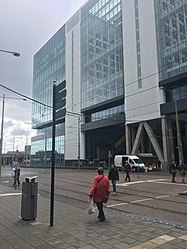Ministry of Foreign Affairs (Netherlands)
Dutch: Ministerie van Buitenlandse Zaken | |
 Logo of the Ministry of Foreign Affairs | |
 Building of the Ministry of Foreign Affairs | |
| Department overview | |
|---|---|
| Formed | 12 March 1798 (1798-03-12) |
| Jurisdiction | Kingdom of the Netherlands |
| Headquarters | Rijnstraat 8, The Hague, Netherlands |
| Employees | 3,000 |
| Annual budget | €13,2 billion (2018)[1] |
| Ministers responsible |
|
| Department executive |
|
| Website | Ministry of Foreign Affairs (in English) |
The Ministry of Foreign Affairs (Dutch: Ministerie van Buitenlandse Zaken; BZ) is the Dutch Ministry responsible for Foreign relations, Foreign policy, International development, International trade, Diaspora and matters dealing with the European Union, NATO and the Benelux Union. The Ministry was created in 1798 as the Department of Foreign Affairs of the Batavian Republic. In 1876, it became the Ministry of Foreign Affairs. The Minister of Foreign Affairs (Dutch: Minister van Buitenlandse Zaken) is the head of the Ministry and a member of the Cabinet of the Netherlands. The current Minister is Stef Blok. The Minister for Foreign Trade and Development Cooperation (Dutch: Minister voor Buitenlandse Handel en Ontwikkelingssamenwerking) is a Minister without portfolio within the Ministry of Foreign Affairs. The current Minister is Sigrid Kaag.[2]
Kingdom of the Netherlands |
|---|
![Azure, billetty Or a lion with a coronet Or armed and langued Gules holding in his dexter paw a sword Argent hilted Or and in the sinister paw seven arrows Argent pointed and bound together Or. [The seven arrows stand for the seven provinces of the Union of Utrecht.] The shield is crowned with the (Dutch) royal crown and supported by two lions Or armed and langued gules. They stand on a scroll Azure with the text (Or) "Je Maintiendrai" (French for "I will maintain".)](http://upload.wikimedia.org/wikipedia/commons/thumb/8/8f/State_coat_of_arms_of_the_Netherlands.svg/150px-State_coat_of_arms_of_the_Netherlands.svg.png) |
This article is part of a series on the politics and government of the Netherlands |
Constitution
|
Monarchy
|
Cabinet
|
States General
|
Judiciary
|
Elections
|
Local government
|
Foreign relations
|
Related topics
|
|
Contents
1 History
2 Responsibilities
3 Organisation
4 List of Ministers of Foreign Affairs
5 References
6 External links
History
The Ministry was formed in 1798 as the Department of Foreign Affairs.[3] Since 1965 a special Minister for International Development has been appointed in each government with the exception of the First Balkenende cabinet and the First Rutte cabinet).
Responsibilities
The Ministry is responsible for the foreign relations of the Netherlands and its responsibilities are as follows:[4]
- to maintain relations with other countries and international organisations.
- to promote cooperation with other countries.
- to help developing countries accelerate their social and economic development through international cooperation.
- to promote the interests of Dutch nationals and the Netherlands abroad.
- to collect information on other countries and international developments for the Government and other interested parties.
- to provide information on Dutch policy and the Netherlands' position on international issues and developments.
- to present the Netherlands to the world.
- to deal with applications from and the problems of foreigners living in the Netherlands or seeking to enter or leave the country.
Organisation
The Minister of Foreign Affairs and the Minister for Foreign Trade and Development Cooperation provide political leadership to the Ministry. The ministry consists of four directorates-general, which deal with a particular policy area:[5]
- The Directorate-General for Political Affairs is concerned with peace, security and human rights. This includes the EU's Common Foreign and Security Policy, the political role of NATO, the United Nations ands the guidance for embassies and other diplomatic missions.
- The Directorate-General for European Cooperation concerns itself with the European Union. It is responsible for Dutch relations with EU members and candidate countries. It also coordinates policy in other regional organisations like the Council of Europe, the OECD and the Benelux .
- The Directorate-General for International Cooperation is responsible for international development, in line with the four Dutch priorities of water, security and the rule of law, food security and sexual and reproductive health and rights.
- The Directorate-General for Foreign Economic Relations promotes the interests of Dutch businesses abroad and helps shape the Dutch contribution to the global economic order.
The Netherlands has about 140 diplomatic missions abroad,[6] see list of diplomatic missions of the Netherlands.
List of Ministers of Foreign Affairs
See List of Ministers of Foreign Affairs of the Netherlands.
References
^ (in Dutch) [https://www.rijksoverheid.nl/onderwerpen/prinsjesdag/miljoenennota-en-rijksbegroting
^ (in Dutch) "Diplomate Sigrid Kaag wordt nu zelf de baas". NOS. 23 October 2017. Retrieved 14 January 2018..mw-parser-output cite.citation{font-style:inherit}.mw-parser-output .citation q{quotes:"""""""'""'"}.mw-parser-output .citation .cs1-lock-free a{background:url("//upload.wikimedia.org/wikipedia/commons/thumb/6/65/Lock-green.svg/9px-Lock-green.svg.png")no-repeat;background-position:right .1em center}.mw-parser-output .citation .cs1-lock-limited a,.mw-parser-output .citation .cs1-lock-registration a{background:url("//upload.wikimedia.org/wikipedia/commons/thumb/d/d6/Lock-gray-alt-2.svg/9px-Lock-gray-alt-2.svg.png")no-repeat;background-position:right .1em center}.mw-parser-output .citation .cs1-lock-subscription a{background:url("//upload.wikimedia.org/wikipedia/commons/thumb/a/aa/Lock-red-alt-2.svg/9px-Lock-red-alt-2.svg.png")no-repeat;background-position:right .1em center}.mw-parser-output .cs1-subscription,.mw-parser-output .cs1-registration{color:#555}.mw-parser-output .cs1-subscription span,.mw-parser-output .cs1-registration span{border-bottom:1px dotted;cursor:help}.mw-parser-output .cs1-ws-icon a{background:url("//upload.wikimedia.org/wikipedia/commons/thumb/4/4c/Wikisource-logo.svg/12px-Wikisource-logo.svg.png")no-repeat;background-position:right .1em center}.mw-parser-output code.cs1-code{color:inherit;background:inherit;border:inherit;padding:inherit}.mw-parser-output .cs1-hidden-error{display:none;font-size:100%}.mw-parser-output .cs1-visible-error{font-size:100%}.mw-parser-output .cs1-maint{display:none;color:#33aa33;margin-left:0.3em}.mw-parser-output .cs1-subscription,.mw-parser-output .cs1-registration,.mw-parser-output .cs1-format{font-size:95%}.mw-parser-output .cs1-kern-left,.mw-parser-output .cs1-kern-wl-left{padding-left:0.2em}.mw-parser-output .cs1-kern-right,.mw-parser-output .cs1-kern-wl-right{padding-right:0.2em}
^ "Geschiedenis ministerie BZ". Rijksoverheid.
^ "Government.nl". Retrieved 15 January 2017.
^ "Rijksoverheid". Retrieved 15 January 2017.
^ "Rijksoverheid". Retrieved 15 January 2017.
External links
Official website (in Dutch)
Official website (in English)
